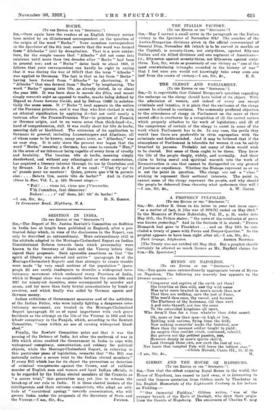ROCHE.
[To rim Eerroa or THE " SPECmTOR.."]
Sza,—Once again have the readers of an English literary review been misled by an ill-informed correspondent on the question of the origin of the •word " Boohe." Your nameless oorrespondent in the Spectator of the 9th inst. asserts that the word was formed from "Alleboehe " (sic) by decapitation. That is a pure conjec- ture, for the simple reason that "Alboche" did not come into existence until more than two decades after " Bache " had been in general use;. and as " Botha" dates back to about 1860, it fellows that your correspondent can hardly be right in saying that it was during the war of 1870-71 that the term " Alboche " was applied to Germans. The -fact is that so far from " Boche " having been formed from " Alboche " by shortening, it is "Alboche" that was formed from " Beebe" by lengthening. The word. " Boche " sprang into life, as already stated, in or about the- year 1860. It was born dans le monde des fines, and meant simply manuals sujet as' opposed to muChe, muche being defined by Rigaud as Jeune homme timide, and by Delvan (1806) in-substan- tially-the same sense. It (" Boche ") next appears in. the milieu of the Parisian printers, and it was they who first clothed it with an ethnical signification by applying it—but not until nearly a lustrum after the Franco-Prussian War—to printers of Flemish or German origin, and in no worse sense than thick-head—i.e., hard of comprehension; dull. It was really short for tete de .boche, Meaning dolt or blockhead. The extension of its application to Germans in general; including Luxemburgers and Alsatians, all of 'whom came to• bwknown, many years later, as " Alboches." was an easy -step, It is only since the present war began that the word "-Socha," meaning' a German; has come to connote " Hon," in"thasense of -air inhuman' being capable of -every form of cruelty and brutality. The locution tete de boche, meaning' simply dunderhead; and withbut any ethnological or other connotation, has acquired a literary interest through its use by Courbaline and by Bruant. In Le' train de 8 h. 47 we read : " C'est t'y qu' to m' prowls-pour-tar merrteur ! Quiem, preuve quo permis- sion : . . . Saietti lire, seer& •t6te de ,boche?" And in Cotier (Dans la.kue; Vol. I., p. 151) Bruant•sings:— "Psit! . . . viens ici, viens que j't'aocroche, V'lh l'omndbus, fast d6marrer !
'Whim! . . . cul' done, he! tft' de boched " —1 am, Sir, &a., D. N. Samoa. 74 Grosvenor Road, Highbury, N.6.










































 Previous page
Previous page